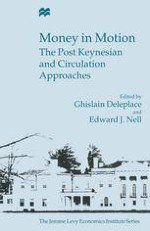1996 | OriginalPaper | Chapter
Money as Purchasing Power and Money as a Stock of Wealth in Keynesian Economic Thought
Author : Augusto Graziani
Published in: Money in Motion
Publisher: Palgrave Macmillan UK
Included in: Professional Book Archive
Activate our intelligent search to find suitable subject content or patents.
Select sections of text to find matching patents with Artificial Intelligence. powered by
Select sections of text to find additional relevant content using AI-assisted search. powered by
Ever since the publication of Keynes’s General Theory, the definition of money as a stock of wealth has become dominant in economic theory. As all know, it has not always been so in the history of economic ideas. Originally the dominant character of money was considered as being endowed with purchasing power, and money was consequently defined as a means of exchange. The emphasis was moved away from the means-of-exchange function toward the store-of-wealth function as the result of a long debate concerning the definition and measurement of the value of money. It was then clear that money, if defined as mere purchasing power, could only be endowed with an indirect utility, originating from the utility of the goods money could buy on the market. On the other hand, if money had to yield utility on its own, it had to be useful not only when spent upon commodities but also when kept as a store of wealth. Money had consequently to be defined as a stock of liquid wealth.
